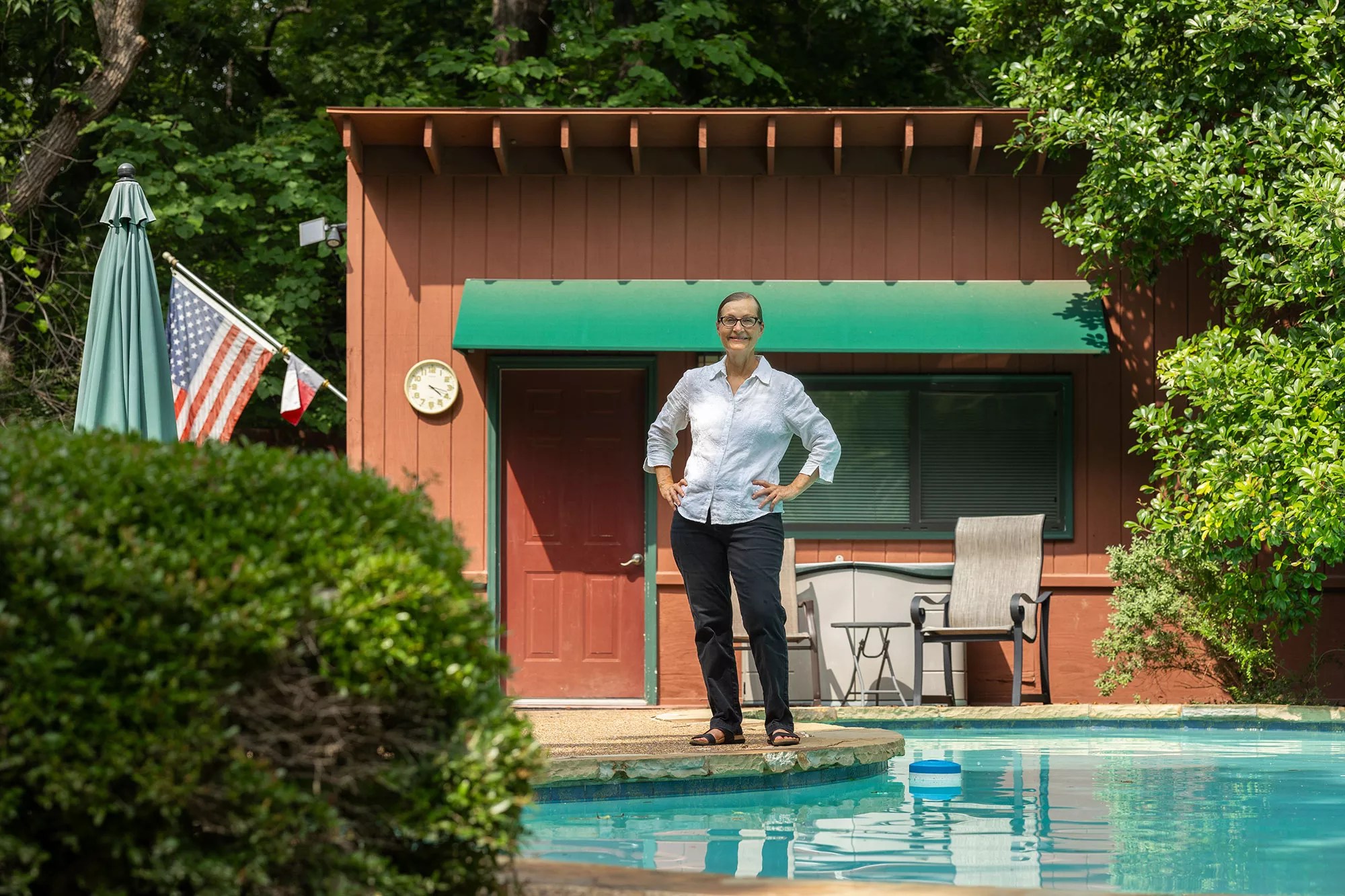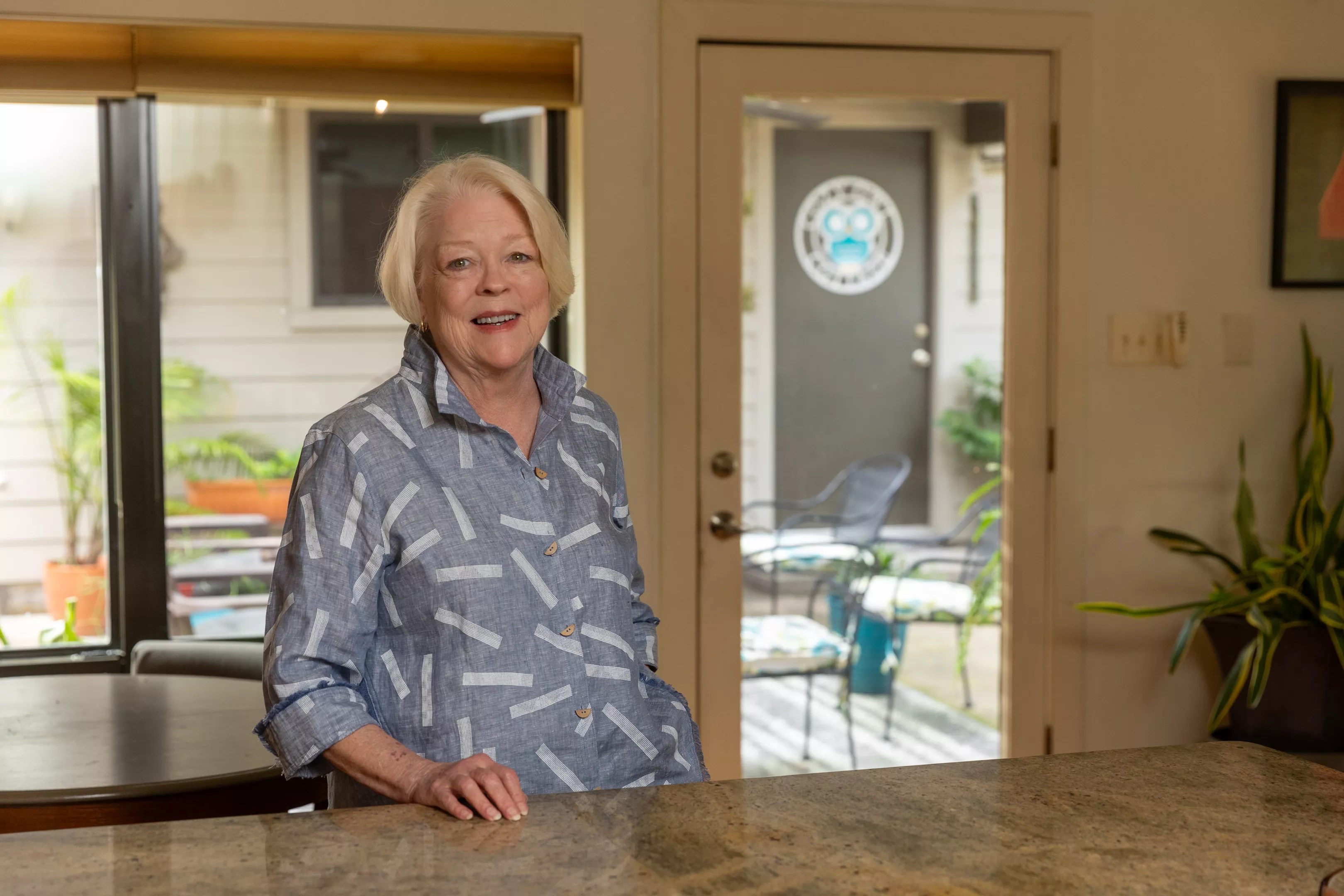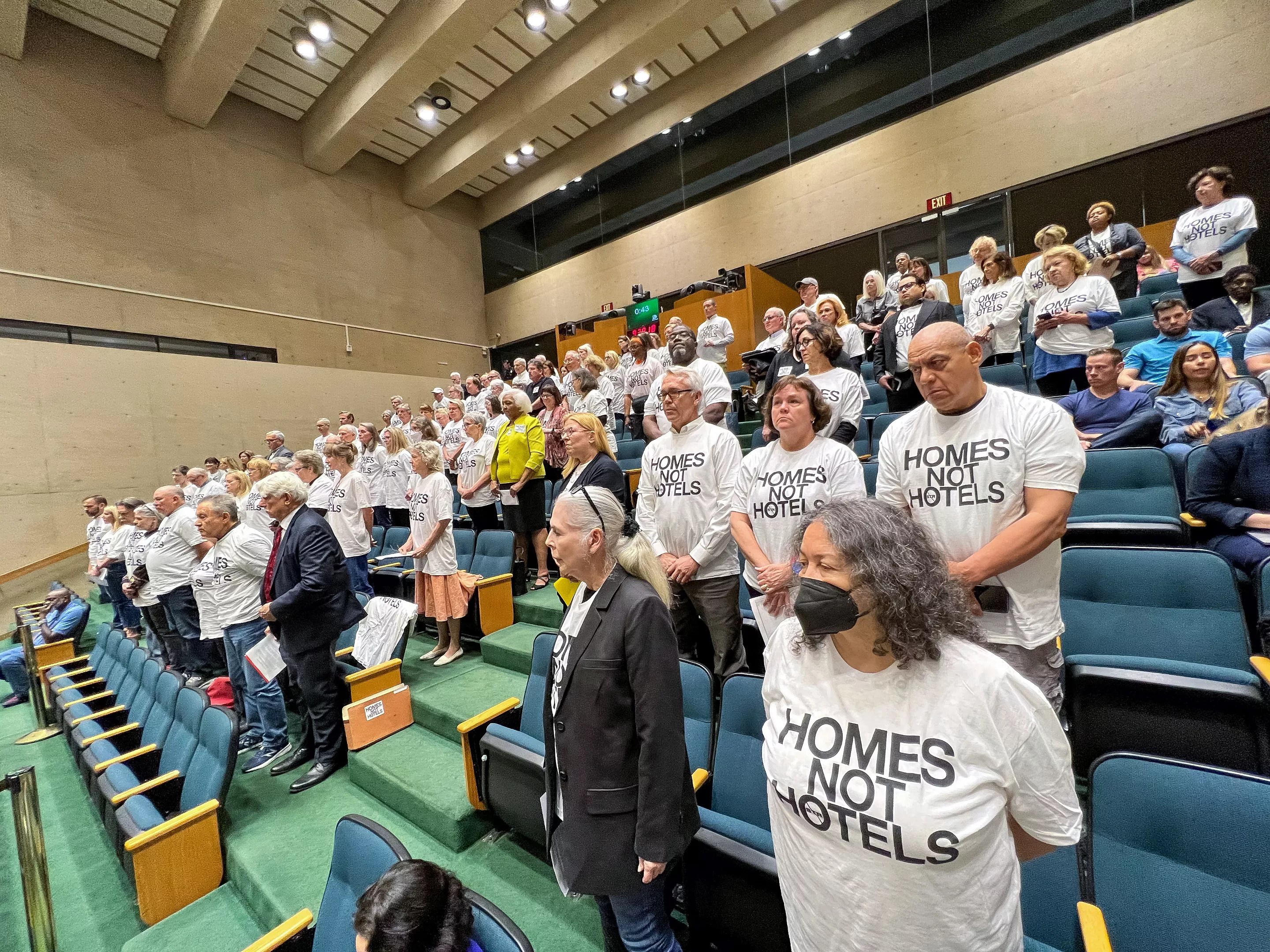
Nathan Hunsinger

Audio By Carbonatix
It’s not often Dallas City Hall is rockin’ at midnight, but June 14 wasn’t just any night – certainly not for the dozens of people who had been waiting literally all day and night for a decision to be made.
After more than three years of master plans, committees, recommendations, briefings, complaints, delays, debates, campaigns and more than a bit of animosity, a question that had long been without an answer finally got one. In a 12-3 vote, the City Council decided that short-term rentals like those marketed on popular services Airbnb and VRBO will not be allowed in single-family residential neighborhoods in Dallas.
Many of those in attendance, who had also been at many other council meetings over the years, wore white T-shirts with large black letters stating “Homes Not Hotels.” Cara Mendelsohn, one of the council members who has long opposed short-term rentals in residential neighborhoods, wore such a shirt under her pink blazer.
A large number of those who make up the vocal sector of the Dallas Neighborhood Coalition live near short-term rentals that have been deemed “party homes” because of a lack of a live-in owner and the stream of large, disruptive groups coming and going from the properties. Some party-home neighbors say the owners of the problem houses aren’t accountable for what happens in and around the properties because they’re never there to begin with.
On a Saturday night earlier this month a party was underway in Northwest Dallas, and it was absolutely raging. Pot smoke wafted, music blared, scattered revelers danced while others strolled and hollered up and down both sides of the street. Some partiers poured liquor from bottles into fellow partiers’ mouths.
The scene continued to carry its raucous vibe well into the night and into early Sunday morning. The darker the sky got, the more people showed up. More cars lined the street in both directions. That’s when dozens of gunshots rang out. First, the shots came from a vehicle making its way past the party, then the fire was returned by at least one of the partiers.
Valley Ridge Road is where the chaotic, and potentially deadly, party unfolded. That’s not a local dance club, bar or concert venue. It’s not the name of a music or arts festival. It’s an otherwise typical, tree-lined residential neighborhood street a few blocks south of Walnut Hill Lane.
Bullets entered the sides of houses, garage doors and car windows. Police said no one was injured in the shooting, although one neighborhood mother recounted the terror she and her daughter never expected to feel on their street, just two doors down from the house hosting the party. Sonya Hebert, the mother who witnessed this all firsthand, told this story to the City Council and to local TV news.
She’s among those who say that short-term rentals are lodging and should be restricted to areas zoned for “lodging use,” which would also mean they cannot operate in residential neighborhoods.
The coalition has spearheaded the efforts against Airbnb, VRBO and other platforms that rent houses for fewer than 30 days at a time. Its members say they’ve had to endure problems from extra trash, overflowing parking, an increase in crime, noise and more from houses that operate as short-term rentals instead of typical single-family homes.
With the vote to bar short-term rentals from residential neighborhoods, the city says it will begin enforcing the new zoning in six months. Rentals will still be allowed in some commercial and multi-family residential zones, although such areas make up a tiny percentage of the Dallas map. Current short-term rental operators will need to quickly look into options such as turning their properties into traditional long-term rental units or even selling the property outright.
“Overnight, Dallas has become the poster child for local governmental overreach in Texas.” – Lisa Sievers, Dallas Short-Term Rental Alliance
Arlington and Fort Worth have recently enacted similar bans as well, although it’s too early to know whether the move has succeeded, and both of those cities have far fewer STR properties than Dallas. Plano recently voted to temporarily ban new short-term rentals from operating following high-profile incidents involving shootings and prostitution in residential neighborhoods.
Grapevine, a fraction of the size of Dallas but a popular destination for tourism and family attractions, passed an ordinance in 2018 strictly prohibiting short-term rentals from operating within the city limits. That measure is being fought in court by a homeowner plaintiff who claims their rights as a property owner are being violated.
Houston, San Antonio and Austin each have varying degrees of similar regulation in place, but nothing resembling the restrictions Dallas now offers. That’s not to suggest those cities haven’t had their share of party house problems, because they certainly have. During the recently completed Legislative session, House Bill 2665, aimed to limit local government’s power to regulate short-term rentals, made some progress before being tabled.
Outside of Texas, more regulation has been instituted in the largest cities, with New York City mandating that the owner of a short-term rental property must stay in the rental with the guests at the same time. Los Angeles requires a short-term rental to be the primary residence of its owner, and Chicago requires a two-night minimum reservation. But Dallas is the largest city in the U.S. to put this sort of wide-sweeping restriction into place, skipping any sort of regulation altogether.
“We are relieved and grateful that the council finally took action to protect homes and neighborhoods and residential zoning in Dallas,” Olive Talley of the Dallas Neighborhood Coalition told the Observer the day after the vote.
There’s no mistaking the June 14 council vote was a victory for the Dallas Neighborhood Coalition and those who share its view, but there’s still a long way to go before Dallas residential neighborhoods are genuinely free of short-term rentals, if that’s even a realistic possibility.
“We have legal counsel on retainer, and we’re going to be talking about next steps immediately,” Lisa Sievers, a Dallas Airbnb host and a board member of the Dallas Short-Term Rental Alliance, told the Observer. “Overnight, Dallas has become the poster child for local governmental overreach in Texas. Thousands of entrepreneurs have been put out of business, and now millions of enforcement dollars have been transferred onto the backs of taxpayers.”
In a statement sent to the Observer, Luis Briones, public policy manager for Airbnb, said, “Airbnb and our Host community have actively engaged with the City of Dallas in its years-long process to advocate for fair short-term rental rules, and we are disappointed by the City Council’s vote that will prevent responsible residents from sharing their home to supplement their income.”
***

Denise Lowry is a short-term rental owner. She rents out the house behind her own.
Nathan Hunsinger
Short-term rental proponents have advocated for giving at least some regulation a shot before completely closing down residential rentals. They say that they provide value to the community by employing people to help maintain the properties and by sending guests to local outlets for food, supplies and recreation. And as home- and business-owners, they believe their rights are being violated by a ban.
A large number of Dallas short-term rentals are owned by a small number of companies, including some from out of town, but there are still many properties in Dallas owned by independent hosts who live here. This zoning will take away livelihoods for many, plenty of Airbnb hosts have told the City Council.
“There have been no rules,” Siever said following an eventful City Council briefing on June 7, a week before the decisive vote. “There have been no regulations. There’s been nothing, and that has made it so that no one can enforce anything. If there would’ve been an ordinance in place to address some of this three or four years ago, we would probably not be having the problems we are having right now.”
But such a notion has, more or less, always been a non-starter for those opposed to short-term rentals in neighborhoods. They believe that it all comes down to the question of zoning, not compromise, so the perceived middle ground of regulations doesn’t really apply. If a building should be zoned as a hotel, it doesn’t belong near homes, they say, regardless of any additional rules that might be applied by the city.
“If every STR in the city was an angel and there were no problems, we wouldn’t be having this fight.” – Olive Talley, Dallas Neighborhood Coalition
To Talley, that’s almost all true. Zoning is the right move, she said, but the amount of disruption from short-term rentals has presented a problem that needs addressing, regardless of possible zoning matters.
“The number of 911 calls, the number of 311 calls, the number of shootings, these types of incidents happening with STRs are certainly the reason why we are trying to stand strong on zoning,” she said before the June 14 vote. “If every STR in the city was an angel and there were no problems, we wouldn’t be having this fight.”
None of the owners we spoke to or that we watched speak to the City Council discounted the misery that a party house can bring to its neighbors. Sievers has served on three city short-term rental task forces and has heard the horror stories. She agrees the bad actors who allow party houses to wreak havoc should be held accountable.
But she said she’s not one of those, nor are many other owners in Dallas, and it is rare for people to hear about non-party houses because they act as good neighbors. Similar to how both sides agree that party houses are a blight, both sides agree that the vast majority of rentals are not problem spots.
“Party houses are what makes the news,” Sievers said. “What doesn’t make the news is how a friend of mine has a short-term rental that’s next to a woman taking care of her elderly mother. The elderly mother’s sister rented my friend’s short-term rental so she could be right next door while her sister was dying. Right now, I’ve got a girl staying in one of my short-term rentals that’s here for a 10-week internship. She’s on a budget and she can’t afford a hotel for 10 weeks. People don’t hear those stories.”
***

Members of the Dallas Neighborhood Coalition attend a city hall briefing.
Tim Boole
The name of the plan endorsed by the Dallas Neighborhood Coalition is the “Keep it Simple Solution” (KISS). And on the surface, it is simple. Call short-term rentals “hotels,” then forbid those hotels from operating in residential neighborhoods.
But many rental opponents say that party houses aren’t the only reason they want the rentals barred from residential neighborhoods. They say short-term rentals decrease the amount of affordable housing in a city and might lower the property value of the homes around them.
Like just about any other hot-button issue, there’s a study, report or statistic to support your viewpoint. However, there’s beginning to be more data that suggests short-term rentals, while a unique service, aren’t terribly beneficial to a community’s overall health. That cities like Dallas are finally putting restrictions into place as other cities beef up their own regulations and restrictions is another sign that the rentals have harmful, unintended effects.
According to the city, more than 1,700 short-term rentals were registered in Dallas as of March. Some estimates suggest that possibly a few thousand more are operating in the city unregistered. Those who register are also required to pay the city’s hotel occupancy tax. Sievers says she sees the registration and tax as a contract of sorts between her as a business owner and the city, but again, the definitions of what a short-term rental is and is not seem to be fluid, depending on which side of the debate one is on.
Over the past year, the story that residents and City Council have gotten about the properties in Dallas has been full of twists and turns. A short-term rental impact analysis released in November leaned heavily into the idea that short-term rentals weren’t much of a problem in terms of causing extra trouble or draining city resources any more or less than the average resident might. But that data was based on the properties that were registered, and as a result, is woefully incomplete.
In December, the City Plan Commission recommended the city define short-term rentals as “lodging use,” a move that would facilitate the de facto ban in residential neighborhoods where hotels are prohibited. A presentation on the recommendation noted that “Appx. 95% of properties operating as STRs and paying HOT are within Residential zoned areas” and “these properties will be in violation for illegal land use upon effective date of the ordinance.”
A last-minute, official recommendation by Planning Director Julia Ryan and the city’s Planning and Urban Design Office leaned toward allowing short-term rentals to remain in residential neighborhoods. In the City Council briefing on June 7, when Ryan introduced her concerns over zoning the properties as lodging use to the council, she did so by offering her “personal opinion,” as she described it. It was then, for the first time during this entire process, the council asked Ryan to provide a formal recommendation to consider before the scheduled vote one week later.
The idea to “grandfather in” current rental properties was introduced by council members including Chad West. After more than three years of debate, the City Council seemed hesitant, still, to make a decision. The same night the council voted 12-3 to kick short-term rentals out of residential neighborhoods, another vote to allow currently operating rentals that pay the hotel occupancy tax to remain active failed by an 8-7 vote.
Another key element keeping anything relating to how to handle short-term rentals in Dallas from being simple is the fact that the city’s police and code enforcement departments have been thus far incapable of handling the complaints relating to party houses. The Valley Ridge Road fiasco mentioned earlier? Police didn’t show up for hours. Of course, there’s no one from code enforcement to handle such calls on nights and weekends.
The city has “required” short-term rentals to register and pay the hotel occupancy tax for some time now, but again, there’s been no way to crack down on the suspected thousands of owners operating without meeting the city’s rules.
For now, Sievers and other hosts in Dallas must decide what to do. She does know she’s not taking her properties off the Airbnb platform just yet. Unless something changes, perhaps because of the litigation almost certain to come, enforcement of the new zoning will begin in December.
“It’s fair warning,” Sievers said. “It’s like, we know this is coming, so we have to plan accordingly. It’ll be up to everyone to make their own decisions, but I don’t believe that this issue is done for a moment.”